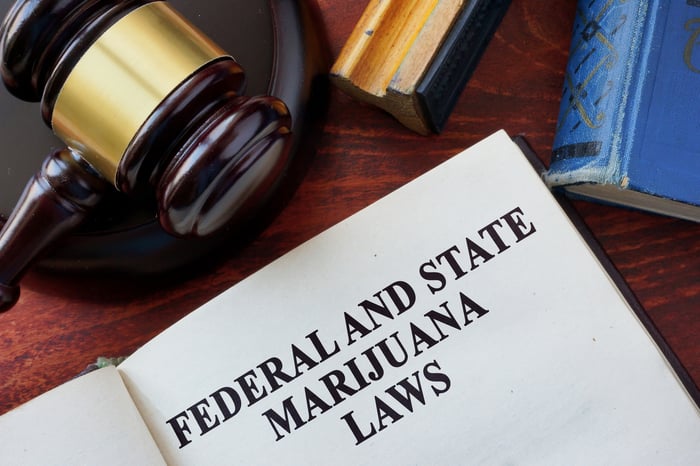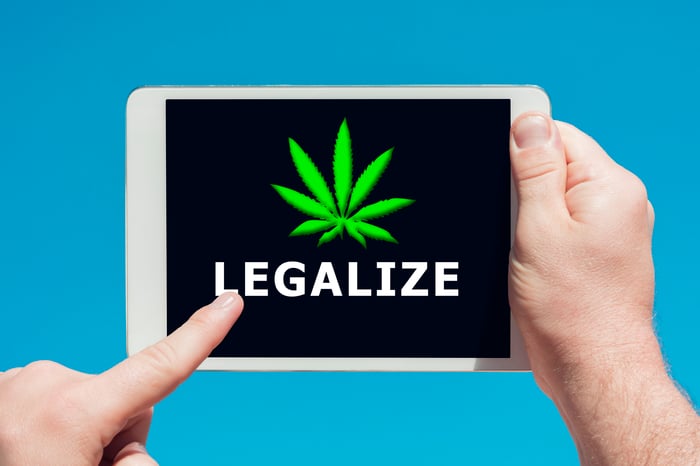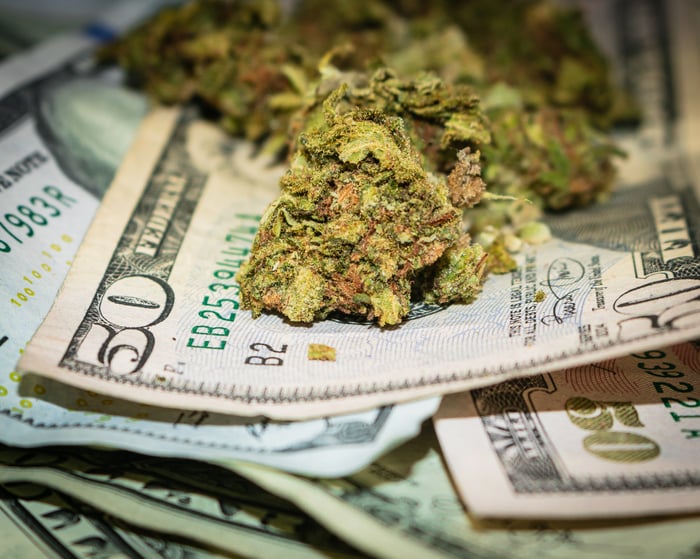Once considered taboo, marijuana is nothing of the sort any longer. The legalization of recreational cannabis in Canada last year legitimized the pot industry and rolled out the red carpet for Wall Street and long-term investors to place their bets.
We witnessed plenty of advancement on the cannabis front in the United States, too, with Missouri and Utah approving medical marijuana, while Vermont and Michigan OK'd recreational use. Also, the U.S. Food Drug Administration approved its first cannabis-derived drug, and President Trump signed the farm bill into law, giving the green light to hemp and hemp-based cannabidiol products.

Image source: Getty Images.
Marijuana gains little traction at the U.S. federal level
Last year probably couldn't have been better for the marijuana industry... save for the small fact that it remains a wholly illegal drug at the federal level in the United States. Classified as a Schedule I substance, cannabis is illicit, highly prone to abuse, and not recognized as having any medical benefits.
As you can imagine, this classification creates challenges for cannabis companies in the U.S., even with roughly two-thirds of the country having legalized pot in some capacity at the state level. For instance, most companies have little or no access to basic banking services. This is because banks fear the potential for criminal and/or financial penalties if caught providing financial services to marijuana companies.
Additionally, Section 280E of the U.S. tax code ensures that profitable weed businesses struggle. This portion of the tax code disallows normal business deductions for companies that sell a federally illicit substance, save for cost of goods sold. The end result can be an effective tax rate of between 70% and 90% for profitable pot businesses.
Americans send a clear message about cannabis to politicians
While there's been little progress at the federal level on cannabis reform, the clear message being sent by the American public is that they'd like to see it happen. Since January 2018, six major polls have been released that gauged the public's perception of cannabis, and they've all shared one thing in common: an overwhelming desire to see recreational pot legalized.

Image source: Getty Images.
Below are the questions and responses of Americans to all six surveys:
Fox News (Feb. 2018): Do you favor or oppose legalizing marijuana?
- Favor: 59%
- Oppose: 32%
CBS News (April 2018): Should marijuana be legal?
- Yes: 59%
- No: 36%
Quinnipiac University (April 2018): Do you think that the use of marijuana should be made legal in the United States, or not?
- Yes: 63%
- No: 33%
Gallup (Oct. 2018): Do you think the use of marijuana should be made legal, or not?
- Yes, legal: 66%
- No, illegal: 32%
Pew Research Center (Oct. 2018): Do you think the use of marijuana should be made legal, or not?
- Legal: 62%
- Illegal: 34%
Boston University (Jan. 2019): Marijuana should be legalized, regulated, and legally sold in your city. (Note: This survey was specifically for city mayors)
- Agree: 55%
- Disagree: 35%
What's perhaps most surprising about Gallup's survey, which has been running for nearly 50 years, is that the Oct. 2018 poll was the first time that a majority of Republicans and senior citizens, two groups known for opposing the expansion of cannabis, were in favor of its legalization. There would, seemingly, be little standing in the way of federal reform.

Image source: Getty Images.
Why doesn't Congress change its tune on pot?
However, looks can be deceiving. For example, in the April Quinnipiac survey mentioned earlier, another question posed to respondents was whether or not they could vote for a political candidate who didn't share their views on cannabis reform. Only about 1 out of 8 respondents said they couldn't, suggesting that a majority of respondents still don't view cannabis reform as a major issue. If politicians have no fear of losing their elected seats over their views on cannabis, then any chance of reform is liable to be pushed to the back burner.
Another problem involves money. Even though marijuana is wholly illegal at the federal level, it doesn't stop the Internal Revenue Service from collecting corporate income tax on cannabis-business profits. And since 280E comes into play, the government collects a high effective tax rate on what's earned. Reforming cannabis means removing this effectively high tax rate and allowing pot-based businesses to take normal corporate income tax deductions. This would be expected to cost the federal government $5 billion in tax revenue over a 10-year period.
Lastly, we have to understand that Republicans control the Senate, and President Trump is a Republican. Historically, the GOP has had a more negative view of marijuana than Democrats, which makes the Republican Party less likely to endorse any reform measures.

Image source: GW Pharmaceuticals.
Baby steps, for now
In the meantime, the American public and investors have to take victories where they can when it relates to the cannabis movement.
For instance, this past June saw GW Pharmaceuticals (GWPH) become the first drugmaker to get a cannabis-derived drug approved by the Food and Drug Administration. GW Pharmaceuticals' lead therapy Epidiolex is an oral cannabidiol (CBD)-based medicine targeted at two rare types of childhood-onset epilepsy (Dravet syndrome and Lennox-Gastaut syndrome). In multiple clinical-stage studies, Epidiolex ran circles around the placebo in terms of seizure reduction relative to baseline.
Perhaps the bigger victory for GW Pharmaceuticals is that its lead drug was given a Schedule V classification, which is the least restrictive possible. Essentially, GW Pharmaceuticals demonstrated that cannabis can have medical benefits, and it's opened the door for possible reforms.
Then there's the legalizing of hemp and hemp-based CBD products in December, which represents another baby step forward in the reform department. Oddly enough, it's Canadian-based Canopy Growth (CGC -0.77%) that'll potentially be one of the biggest beneficiaries of this legalization. That's because Canopy Growth was recently awarded a hemp production and processing license in New York state and the company intends to spend between $100 million and $150 million to get this facility up and running in the southern tier of the state.
In November, Canopy Growth also closed on its acquisition of Colorado-based ebbu, which has a bountiful portfolio of intellectual property (IP) concerning the hemp and cannabis industries. This IP could help transform Canopy Growth into a go-to hemp processor in the United States.
Though progress may seem slow, the U.S. appears to be taking steps in the direction of marijuana reform or legalization at the federal level.
Check out the latest Canopy Growth earnings call transcript.





